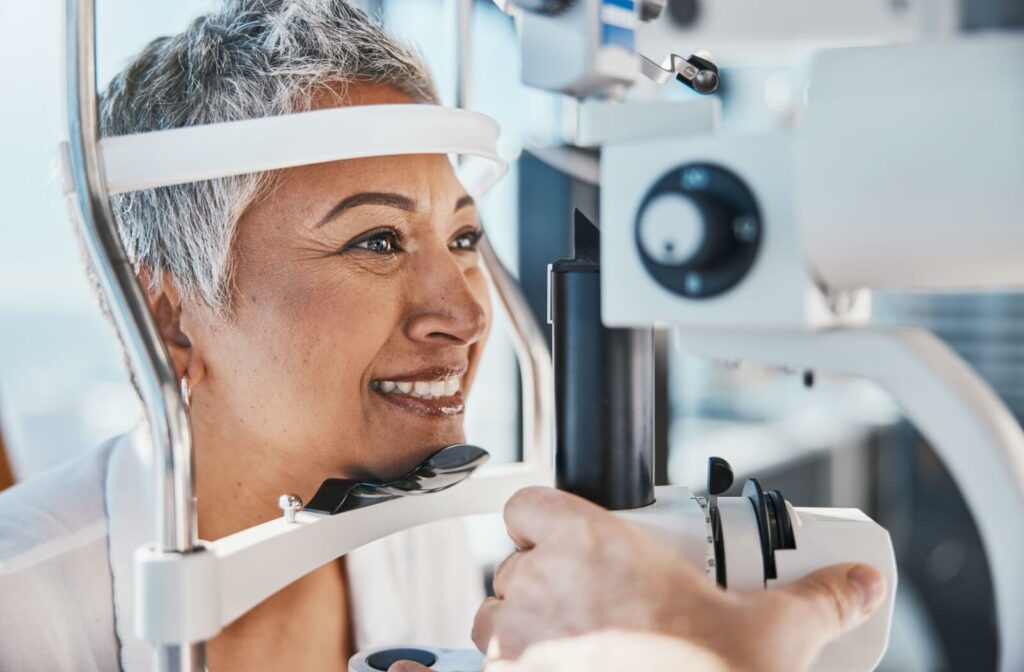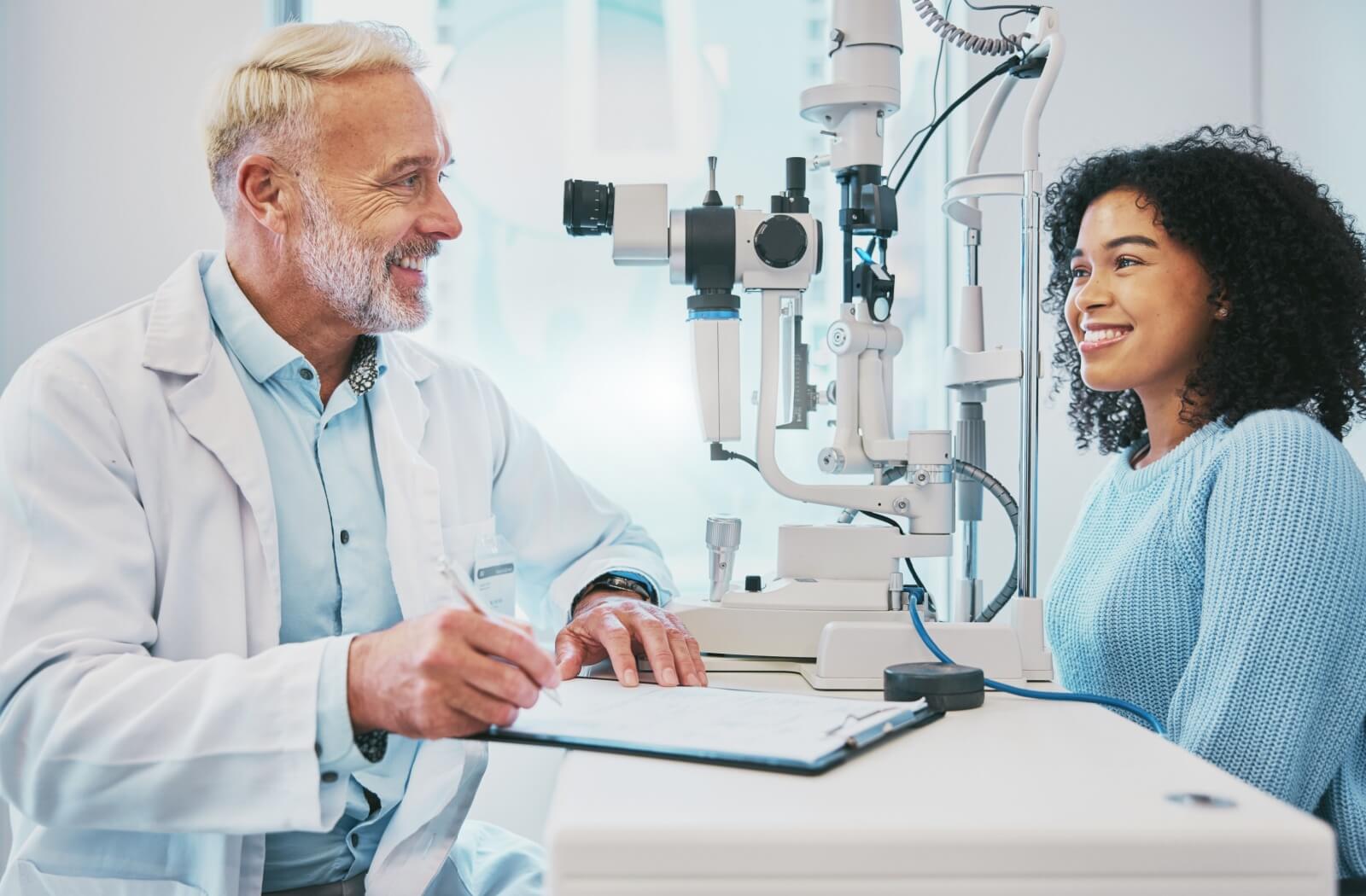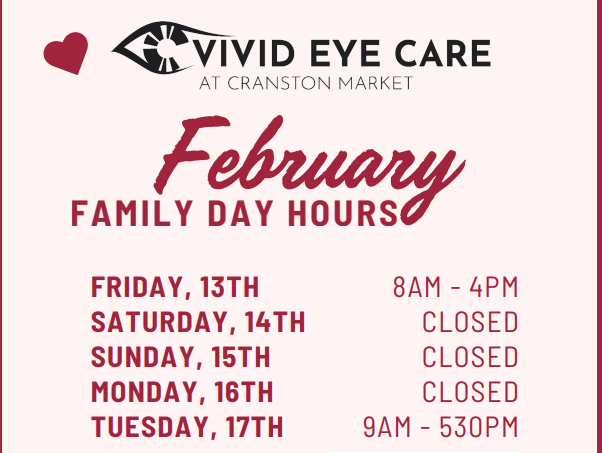Your eyes are a crucial part of your everyday life, but it’s easy to take them for granted. You rely on your eyes for nearly everything you do, but many people neglect a simple step that can be key to safeguarding their sight—regular comprehensive eye exams. They’re a simple way to preserve your vision and eye health.
But how often should you have an eye exam? In general:
- For children aged 18 and younger, it’s recommended to schedule annual eye exams
- For adults aged 19-64, it’s recommended to schedule eye exams every 2 years
- For seniors aged 65+, it’s recommended to schedule annual eye exams
Based on other health conditions and what your optometrist detects during an eye exam, they may also recommend a different frequency. For example, contact lens wearers should receive eye exams annually.
However, don’t wait for symptoms to worsen. If you notice any unusual symptoms or vision changes, visit your optometrist as soon as you can.
The Importance of Regular Eye Exams
Think back to your last eye exam. You probably remember a chart on the wall covered in small letters or a machine with different lenses. These are crucial parts of an eye exam, but many people don’t realize that eye exams are about more than just checking your vision.
The human eye is a complex organ, and as you get older, it’s susceptible to all kinds of changes, diseases, and eye conditions. These often develop with no symptoms at all, and it can be easy to miss their early signs if you don’t know what you’re looking for. Regular eye exams can detect these conditions early and begin treatment right away, helping preserve your eye health.
During a comprehensive eye exam, your optometrist will carefully examine all of the internal structures of your eye and look for signs of these conditions. Eye exams check more than just your prescription. They aim to catch other problems long before they cause permanent damage to your eyes and vision.
What Can Be Detected During an Eye Exam?
During an eye exam, your optometrist will be looking for conditions like:
- Glaucoma, a group of eye conditions that damage the optic nerve
- Cataracts, the clouding of the eye’s natural lens
- Age-related macular degeneration (AMD), which affects the macula and can lead to vision loss
- Diabetic retinopathy, a diabetes-related complication that affects the blood vessels in the retina
- Dry eye, where the eyes are unprotected due to an imbalance in your tear production
These conditions can be managed more efficiently when detected early.
What to Expect During an Eye Exam
When you schedule an eye exam, the process starts the moment you walk through our doors. It helps to bring along:
- Your current eyeglasses and contact lens prescription
- A list of any medications you’re taking
- A list of any concerns you have, or recent symptoms or changes in your vision
- Your family’s medical history
The exam typically starts with a discussion about your medical history and any vision concerns you may have. We’ll take the time to listen to your concerns and then proceed with the exam itself.
What Happens During Eye Exams?
During the exam, we’ll use a series of different machines and tests to check your:
- Visual acuity
- Eye alignment
- Peripheral vision
- Eye pressure
- Retinal health
- Corneal health
- Optic nerve health
Each step plays a vital role in giving us a complete picture of your overall health. If you have questions or concerns at any point during the exam, feel free to bring them up. Your comfort and safety are a priority!
When to Schedule an Eye Exam
While it can vary depending on age, medical history, and current vision, you should try to schedule:
- At least 1 exam per year for children aged 18 and younger
- At least 2 exams per year for adults aged 19-64
- At least 1 exam per year for adults aged 65+
- At least 1 exam per year if you’ve been diagnosed with diabetes or other eye-related conditions
This gives your optometrist a chance to monitor any changes and address potential problems. However, it’s key to note that you shouldn’t follow this calendar if you’re experiencing anything unusual. If there’s been a change in your vision, any noticeable discomfort, or other eye-related symptoms, visit your optometrist as soon as you can. Your eyes are precious, so their care should be a top priority!

Signs You Need an Eye Exam
If you notice any of the following symptoms, it’s time for your next eye exam:
- Blurry vision
- Frequent headaches
- Constant eye strain
- Poor low-light vision
- Double vision
- Light sensitivity
These are all signs of something unusual occurring in the eye and that you need to see an optometrist.
Take Care of Your Vision
Your eye health is an important part of your overall well being. If you experience any unusual symptoms, book an appointment with our team at Vivid Eye Care today. A comprehensive eye exam can help us detect potential issues with your eyes.






















